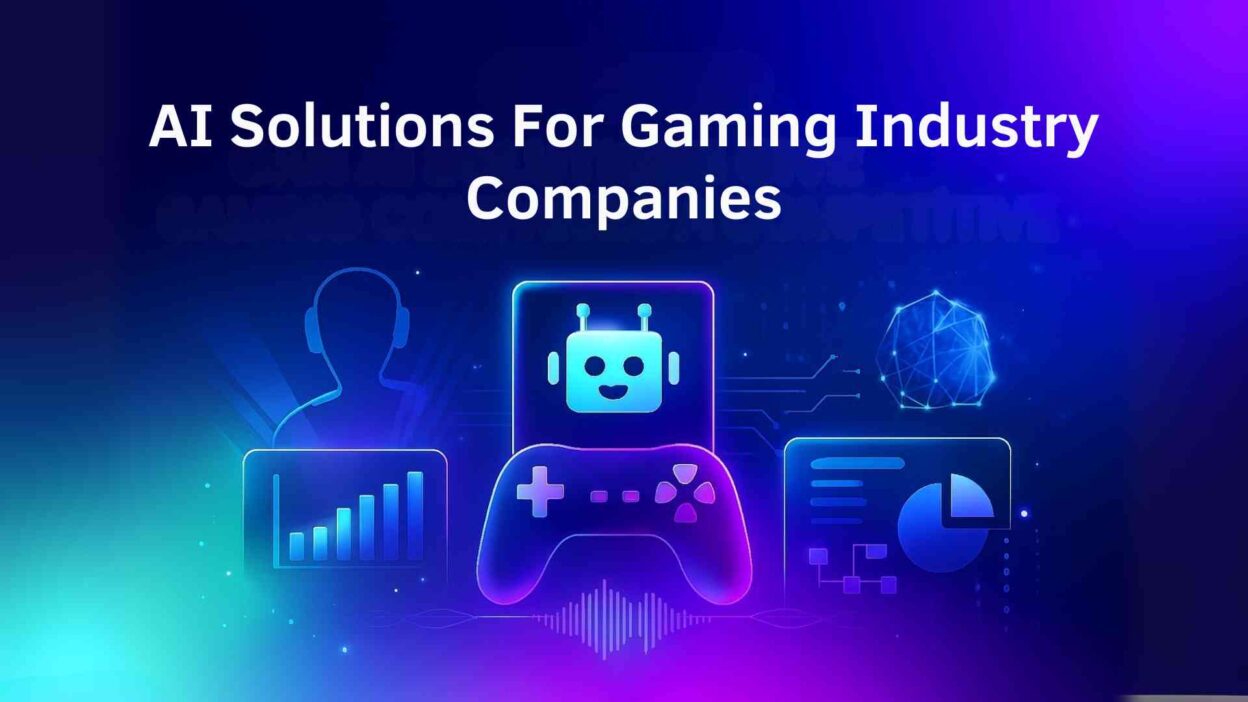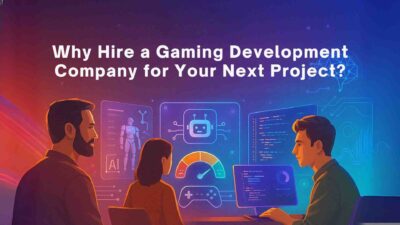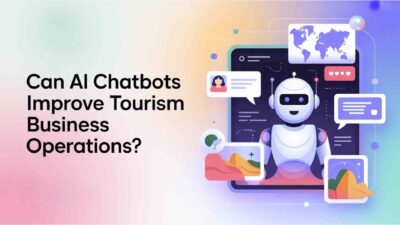TL;DR The gaming industry is experiencing a technological revolution. Competition grows fiercer every single day. Studios need every possible advantage to stand out. AI solutions for gaming industry companies are changing how games get developed and played.
Table of Contents
Traditional development methods are reaching their limits. Players expect more immersive experiences constantly. Budgets and timelines face increasing pressure. Artificial intelligence offers answers to these challenges.
Gaming companies that embrace AI technology gain measurable advantages. Development cycles shorten dramatically. Player engagement increases substantially. Revenue streams multiply through smarter monetization.
The question isn’t whether AI helps anymore. Smart studios are asking how quickly they can implement these tools. Early adopters are already seeing impressive results. Competitors who wait risk falling behind permanently.
The Current State of AI in Gaming
Artificial intelligence has existed in games for decades. Early AI controlled simple enemy movements. Those primitive systems seem laughable by today’s standards. Modern AI capabilities exceed what seemed possible five years ago.
Machine learning now powers sophisticated game systems. Neural networks create realistic character behaviors. Deep learning algorithms generate entire game worlds. The technology advances at a breathtaking pace.
AI solutions for gaming industry companies have moved beyond experimental status. Major studios integrate AI into core development processes. Indie developers access powerful AI tools affordably. The technology democratizes game creation.
Evolution of Gaming AI
Classic games used basic decision trees. Pac-Man ghosts followed predetermined patterns. Players memorized these patterns easily. Early AI lacked adaptability and surprise.
The 2000s brought more sophisticated enemy AI. F.E.A.R. impressed gamers with tactical enemies. Opponents flanked players and used cover intelligently. These systems still followed scripted rules.
Modern AI learns from player behavior dynamically. Neural networks adapt strategies in real-time. No two gameplay sessions feel identical. Unpredictability creates lasting engagement.
Current Market Adoption Rates
Large studios lead AI adoption efforts. EA and Ubisoft invest heavily in AI research. Activision Blizzard experiments with procedural content generation. These companies understand AI’s strategic importance.
Mid-sized studios are catching up rapidly. Tools like Unity ML-Agents make AI accessible. Unreal Engine 5 includes advanced AI features. Barriers to entry have decreased significantly.
Mobile game developers adopt AI enthusiastically. Player behavior analysis drives retention strategies. Automated testing reduces QA costs. Personalized experiences increase in-app purchases.
How AI Solutions Transform Game Development
Development teams face mounting production pressures. Games grow larger and more complex yearly. Manual creation methods cannot scale indefinitely. AI automation addresses these bottlenecks directly.
Asset creation consumes massive amounts of time. Artists spend weeks modeling environments. AI tools generate high-quality assets in hours. Teams redirect creative energy to unique elements.
AI solutions for gaming industry companies accelerate every development phase. Concept art generation starts projects faster. Level design tools create balanced gameplay spaces. Testing automation catches bugs earlier.
Procedural Content Generation
Procedural generation isn’t new to gaming. Minecraft and No Man’s Sky pioneered the approach. AI makes procedural systems far more sophisticated. Generated content feels handcrafted rather than random.
Machine learning creates believable terrain variations. Algorithms understand geological principles naturally. Rivers flow logically through valleys. Mountains form in geologically accurate patterns.
Quest generation systems produce meaningful storylines. AI understands narrative structure fundamentals. Side quests feel purposeful rather than repetitive. Player choices lead to unique outcomes.
Character Animation and Behavior
Motion capture costs hundreds of thousands of dollars. Studios need specialized equipment and actors. AI generates realistic animations from simple inputs. Production budgets shrink while quality increases.
Procedural animation systems create natural movements. Characters adapt to terrain automatically. Injuries affect movement realistically. Weather conditions change animation subtly.
NPC behavior becomes genuinely intelligent. Characters remember player interactions over time. Relationships develop based on player choices. Virtual worlds feel truly alive.
Quality Assurance and Testing
Manual game testing requires enormous human resources. Testers play through scenarios repeatedly. Rare bugs get missed easily. AI testing finds edge cases humans overlook.
Machine learning agents play games millions of times. They discover exploits and balance issues quickly. Automated testing runs continuously overnight. Development cycles compress significantly.
AI solutions for gaming industry companies identify performance bottlenecks automatically. Frame rate issues get flagged instantly. Memory leaks surface before release. Launch quality improves dramatically.
Enhancing Player Experience Through AI
Player expectations have never been higher. Gamers demand personalized experiences constantly. One-size-fits-all design no longer satisfies audiences. AI customization creates unique journeys for everyone.
Difficulty adjustment happens dynamically now. Systems monitor player performance continuously. Challenges scale to maintain engagement. Frustration and boredom both decrease.
Recommendation engines keep players engaged longer. AI suggests relevant content based on behavior. Players discover features they might have missed. Session lengths and retention both increase.
Dynamic Difficulty Adjustment
Traditional difficulty settings feel crude. Easy mode bores experienced players. Hard mode frustrates newcomers excessively. Fixed difficulty cannot satisfy diverse audiences.
AI observes player skill in real-time. Subtle adjustments happen invisibly during gameplay. Enemy accuracy decreases slightly after repeated deaths. Health drops appear more frequently when needed.
Learning curves optimize for each individual. Tutorials adapt to comprehension speed. Advanced players skip redundant explanations. Beginners receive additional guidance naturally.
Personalized Content Delivery
No two players enjoy games identically. Some prefer combat while others like exploration. Story enthusiasts skip optional battles. AI identifies individual preferences accurately.
Content recommendations match player interests. Quest suggestions align with play style. Cosmetic options reflect aesthetic preferences. Everyone sees their ideal gaming experience.
AI solutions for gaming industry companies track engagement metrics precisely. Heatmaps show where players spend time. Drop-off points get identified quickly. Designers iterate based on concrete data.
Intelligent NPC Interactions
Dialogue systems have historically felt mechanical. Pre-written responses limit conversation depth. Players exhaust dialogue trees quickly. Immersion breaks when NPCs repeat themselves.
Natural language processing enables realistic conversations. NPCs respond contextually to player statements. Dialogue feels organic rather than scripted. Relationships develop through genuine interaction.
Characters remember conversation history accurately. Past discussions influence future interactions. Betrayals have lasting consequences. Trust builds gradually through consistent behavior.
AI-Driven Monetization Strategies
Revenue optimization determines studio survival. Monetization must balance profit with player satisfaction. Heavy-handed tactics drive away audiences. AI finds the sweet spot intelligently.
Pricing strategies adapt to individual willingness to pay. High spenders see premium offers. Price-sensitive players receive smaller purchase options. Revenue maximizes without alienating anyone.
AI solutions for gaming industry companies predict player lifetime value accurately. Marketing budgets focus on valuable users. Retention efforts target at-risk players. Resources get allocated efficiently.
Predictive Analytics for In-Game Purchases
Purchase behavior reveals valuable patterns. AI identifies players likely to spend money. Offer timing influences conversion rates dramatically. Recommendations feel helpful rather than pushy.
Dynamic pricing optimizes revenue constantly. Popular items maintain premium pricing. Slow-moving inventory gets discounted automatically. Sales events target specific player segments.
Bundle recommendations increase average transaction values. AI knows which items players want together. Cross-selling happens naturally through smart suggestions. Cart abandonment decreases significantly.
Churn Prediction and Prevention
Player retention costs less than acquisition. Identifying churn risk early enables intervention. AI spots behavioral changes indicating dissatisfaction. Proactive measures keep players engaged.
Warning signs get recognized automatically. Decreased session frequency triggers alerts. Gameplay pattern changes indicate problems. Support teams reach out before players quit.
Personalized retention offers win back wavering players. Gift currencies show appreciation. Exclusive content rewards loyalty. Carefully timed incentives reverse negative trends.
Ad Optimization and Placement
Advertising revenue supports free-to-play models. Poorly placed ads ruin player experience. Excessive frequency drives uninstalls. AI balances monetization with satisfaction.
Optimal ad timing minimizes disruption. Natural breaks in gameplay host advertisements. Rewarded video ads offer clear value. Players choose to engage voluntarily.
AI solutions for gaming industry companies test ad formats continuously. A/B testing happens automatically. Winning variations scale immediately. Revenue per user increases steadily.
Competitive Advantages of AI Implementation
Early AI adopters gain significant market advantages. Development efficiency improves measurably. Production costs decrease while quality rises. Time-to-market shrinks considerably.
Player engagement metrics show clear improvements. Session lengths increase across demographics. Retention rates climb month over month. Community sentiment trends positive.
Financial performance reflects AI benefits directly. Development budgets stretch further. Revenue per player grows consistently. Profit margins expand noticeably.
Faster Development Cycles
Speed to market determines success increasingly. Gaming trends change rapidly. Delayed launches miss cultural moments. AI acceleration keeps studios relevant.
Asset pipelines process work automatically overnight. Manual tasks that took weeks now take days. Iteration cycles spin faster. Polish happens earlier in development.
Bug fixing accelerates dramatically. AI identifies root causes quickly. Suggested fixes reduce engineering time. QA backlogs shrink rather than grow.
Improved Game Quality
Quality directly impacts review scores. Metacritic ratings influence sales heavily. User reviews drive word-of-mouth marketing. Polish matters more than ever.
AI solutions for gaming industry companies catch quality issues early. Automated testing covers edge cases exhaustively. Balance problems surface before players notice. Launch day runs smoothly.
Post-launch support improves through AI monitoring. Performance metrics highlight problems immediately. Hotfixes deploy faster. Player satisfaction remains high.
Data-Driven Decision Making
Intuition alone no longer suffices. Successful studios rely on concrete data. AI analytics reveal hidden patterns. Strategic decisions rest on solid evidence.
Feature popularity gets measured precisely. Development resources focus on valued content. Unpopular features get cut early. Investment returns are maximized consistently.
Market trend analysis informs strategic planning. AI predicts genre shifts before they happen. Studios position themselves advantageously. Competitive positioning improves continuously.
Overcoming Implementation Challenges
AI adoption presents real obstacles. Technical complexity intimidates some teams. Integration with existing pipelines requires planning. Upfront costs concern budget-conscious studios.
Talent acquisition proves challenging. AI specialists command high salaries. Competition for experts is fierce. Training existing staff takes time.
AI solutions for gaming industry companies require cultural shifts. Teams must embrace new workflows. Change management needs careful handling. Leadership commitment is essential.
Technical Integration Hurdles
Legacy systems resist AI integration. Older game engines lack AI support. Retrofitting adds complexity and risk. Migration paths need careful planning.
Data infrastructure must support AI workloads. Machine learning requires substantial computing power. Cloud costs can escalate quickly. Architecture decisions have a lasting impact.
API compatibility issues arise frequently. Different AI tools use varying standards. Integration work falls on engineering teams. Documentation quality varies significantly.
Talent and Training Requirements
AI expertise remains scarce industrywide. Universities produce fewer specialists than needed. Demand far exceeds supply currently. Salary expectations reflect this imbalance.
Internal training programs develop capabilities gradually. Online courses provide foundational knowledge. Hands-on projects build practical skills. Mentorship accelerates learning curves.
Partnerships with AI vendors supplement talent. Managed services reduce hiring needs. Consultants guide initial implementations. Knowledge transfer happens over time.
Cost Considerations and ROI
Initial AI investments seem substantial. Licensing fees for advanced tools add up. Hardware upgrades require capital. Executive buy-in depends on clear ROI.
Pilot projects demonstrate value before full commitment. Small-scale tests validate approaches. Success stories justify broader rollouts. Evidence-based expansion reduces risk.
Long-term cost savings offset initial spending. Automation reduces ongoing labor costs. Efficiency gains compound over time. Profitability improves year over year.
Future Trends in Gaming AI
The AI revolution is just beginning. Current capabilities will seem primitive soon. Emerging technologies promise even greater advantages. Forward-thinking studios prepare now.
Generative AI will transform content creation completely. Entire games might generate from text prompts. Artists will direct AI rather than manually create. Production paradigms will shift fundamentally.
AI solutions for gaming industry companies will become indispensable. Competitive gaming without AI will become impossible. Market leaders will be AI-first studios. Laggards will struggle to survive.
Generative AI for Asset Creation
Text-to-image models already produce concept art. Quality improves with each model update. Style consistency gets better constantly. Artists gain superpowers through AI assistance.
3D model generation from descriptions is emerging. Early results show tremendous promise. Refinement tools will enable precise control. Asset libraries will grow exponentially.
Voice synthesis creates unlimited dialogue options. NPCs can speak any line dynamically. Localization becomes trivial. Voice acting costs plummet.
Advanced Behavioral AI
NPCs will become truly intelligent entities. Conversational AI will enable free-form dialogue. Characters will have authentic personalities. Players won’t distinguish AI from humans.
Emotional intelligence will deepen immersion. Characters will react to player moods. Facial expressions will convey subtle feelings. Relationships will feel genuinely real.
Emergent gameplay will arise from AI interactions. Unscripted moments will surprise developers. Player-generated stories will become legendary. Replayability will increase infinitely.
AI-Powered Game Design
AI will design entire game systems. Balance testing will happen instantly. Thousands of variations will be tested automatically. Optimal designs will emerge through iteration.
Player experience optimization will guide design. AI will predict enjoyment from mechanics. Development teams will make data-informed choices. Risk-taking will have calculated backing.
AI solutions for gaming industry companies will suggest innovative mechanics. Pattern recognition will identify untapped opportunities. Genre fusion will happen intelligently. Creativity will combine with analytics.
Frequently Asked Questions
What are the main benefits of AI for gaming companies?
AI accelerates development cycles significantly. Asset creation happens faster with maintained quality. Testing automation catches bugs earlier in production. Player engagement improves through personalization. Revenue optimization balances monetization with satisfaction. Development costs decrease while game quality rises.
How much does implementing AI solutions cost?
Costs vary widely based on implementation scope. Cloud-based AI tools start around $1,000 monthly. Custom AI development ranges from $50,000 to $500,000. Enterprise solutions cost $100,000 to several million annually. ROI typically appears within the first year. Long-term savings offset initial investments substantially.
Do small gaming studios benefit from AI?
Small studios gain proportionally greater advantages. AI levels the playing field against larger competitors. Affordable tools democratize advanced capabilities. Development efficiency improvements matter more at smaller scales. AI solutions for gaming industry companies of any size deliver measurable value. Indie developers access enterprise-grade technology now.
Will AI replace human game developers?
AI augments rather than replaces human creativity. Developers focus on high-value creative decisions. Repetitive tasks get automated efficiently. Jobs evolve rather than disappear. New AI-related roles emerge constantly. Human artistic vision remains irreplaceable.
How do players react to AI-driven games?
Players rarely notice AI working behind the scenes. Better experiences speak for themselves. Seamless personalization feels natural rather than algorithmic. Dynamic difficulty prevents frustration. Engagement metrics show a clear preference. Quality improvements drive positive reception.
What AI technologies are most important for gaming?
Machine learning powers intelligent game systems. Natural language processing enables realistic dialogue. Computer vision analyzes player behavior from streams. Procedural generation creates unlimited content. Predictive analytics optimize monetization. Reinforcement learning trains sophisticated AI opponents.
Read More: AI Voice Assistants for Municipalities & Utilities
Conclusion

The gaming industry faces a critical inflection point. AI adoption separates market leaders from followers. Companies that embrace these technologies gain undeniable advantages. Those who resist will struggle to compete.
AI solutions for gaming industry companies deliver measurable results across every metric. Development becomes faster and more efficient. Games achieve higher quality with smaller teams. Player engagement and satisfaction both increase.
Financial performance improves through multiple channels. Development costs decrease substantially. Revenue optimization maximizes profitability. Market share grows against slower competitors.
Implementation challenges can be managed with proper planning. Technical hurdles have proven solutions. Talent gaps close through training and partnerships. ROI justifies initial investments convincingly.
The competitive edge from AI grows stronger over time. Early movers establish market positions. Data accumulation creates compounding advantages. Technical expertise becomes a sustainable moat.
Gaming companies must act decisively now. Waiting guarantees falling behind competitors. The technology is mature enough for production use. Risks of inaction exceed implementation risks.
AI solutions for gaming industry companies represent the future of game development. Every major studio will integrate AI eventually. The question is whether you lead or follow. Market dynamics reward early adopters disproportionately.
Small studios can compete with giants through AI. Technology democratization opens new opportunities. Creative vision combines with computational power. Independent developers gain unprecedented capabilities.
Players benefit most from AI advancement. Games become more engaging and personalized. Quality improves while prices remain stable. Entertainment value reaches new heights.
The transformation is happening now. Studios are making AI investments today. Competitive advantages are being established currently. Your company needs an AI strategy immediately.
Gaming’s AI revolution cannot be ignored. Technology will only advance faster. Companies must adapt or become irrelevant. The competitive edge is there for the taking.





